Goodbye NT, Hello WA
የታተመ: 05.01.2021
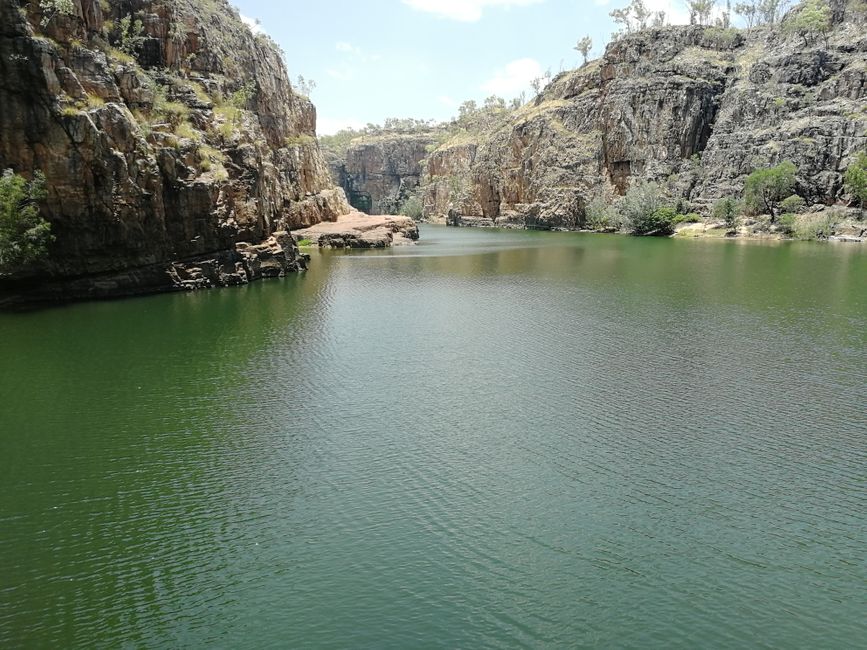
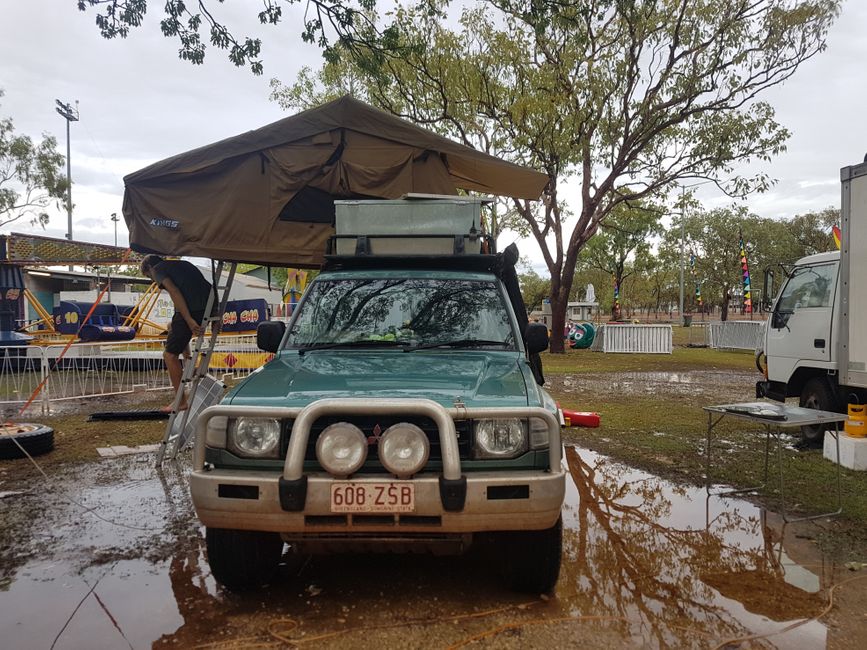
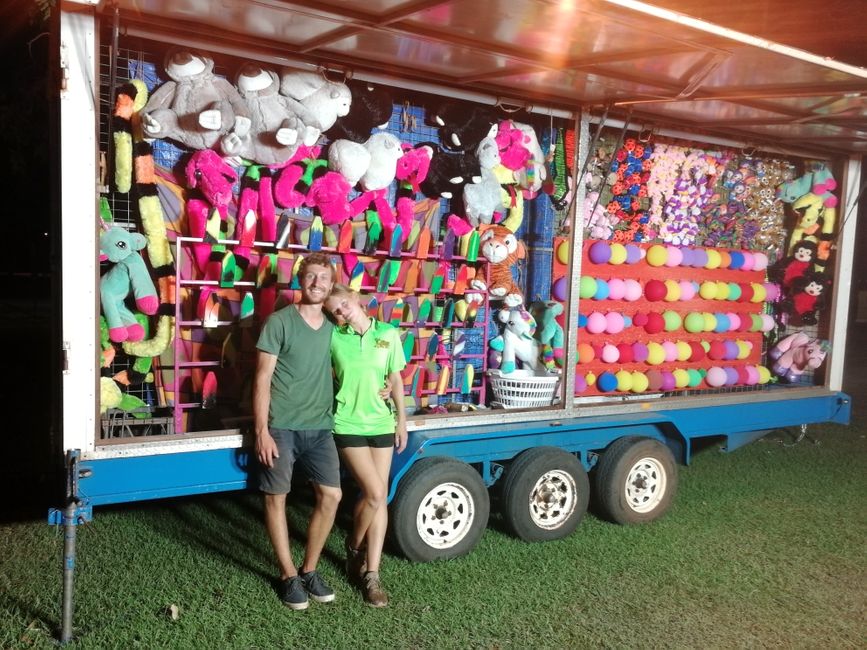
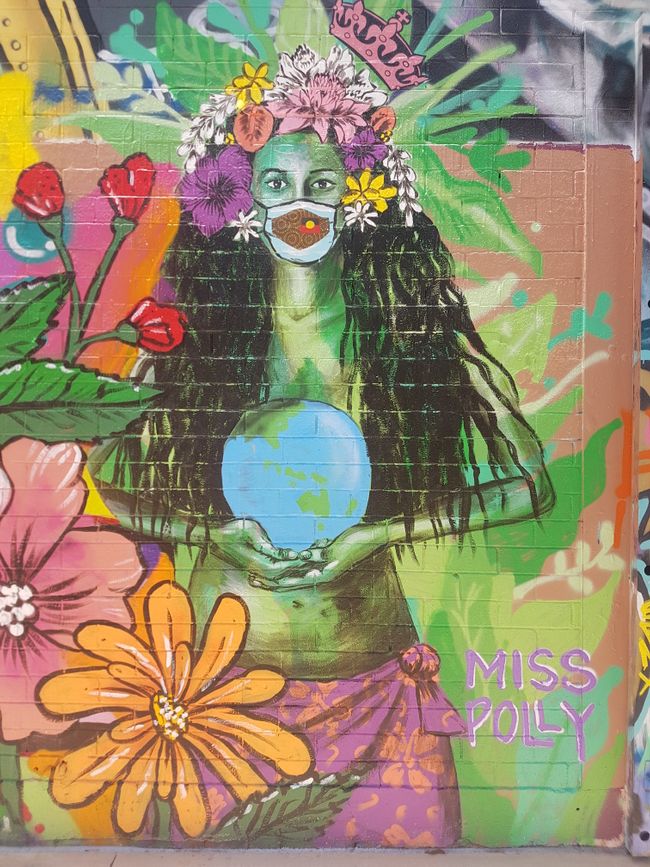
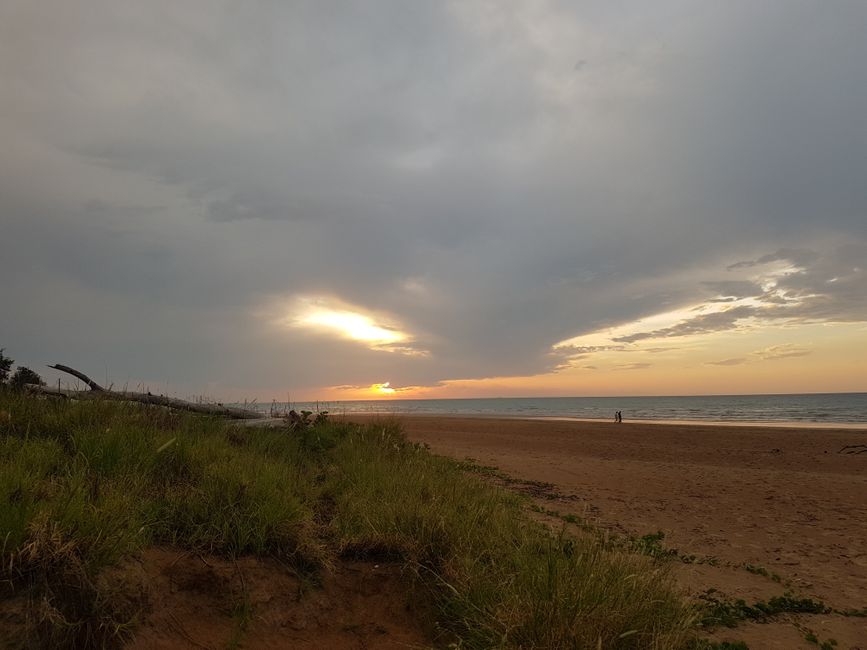
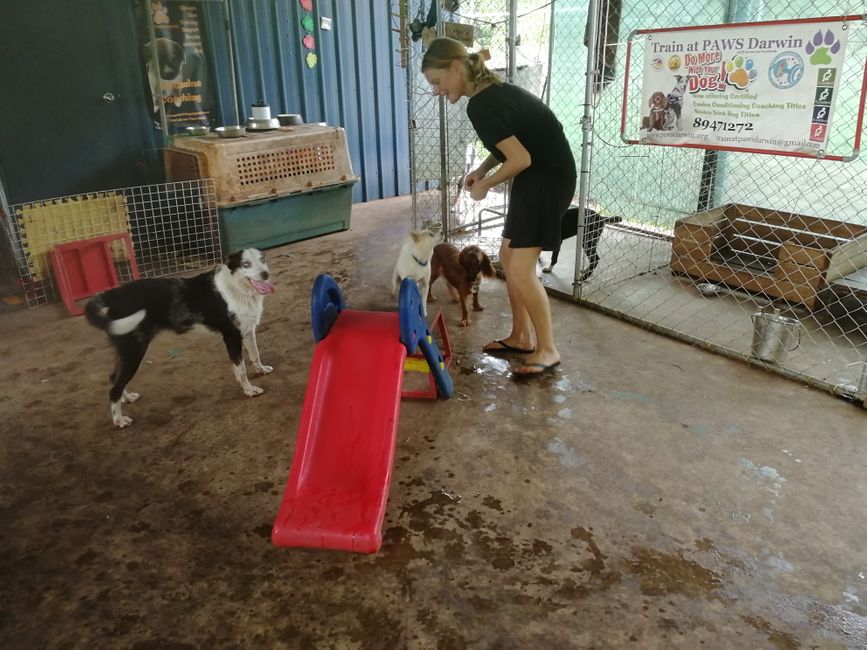
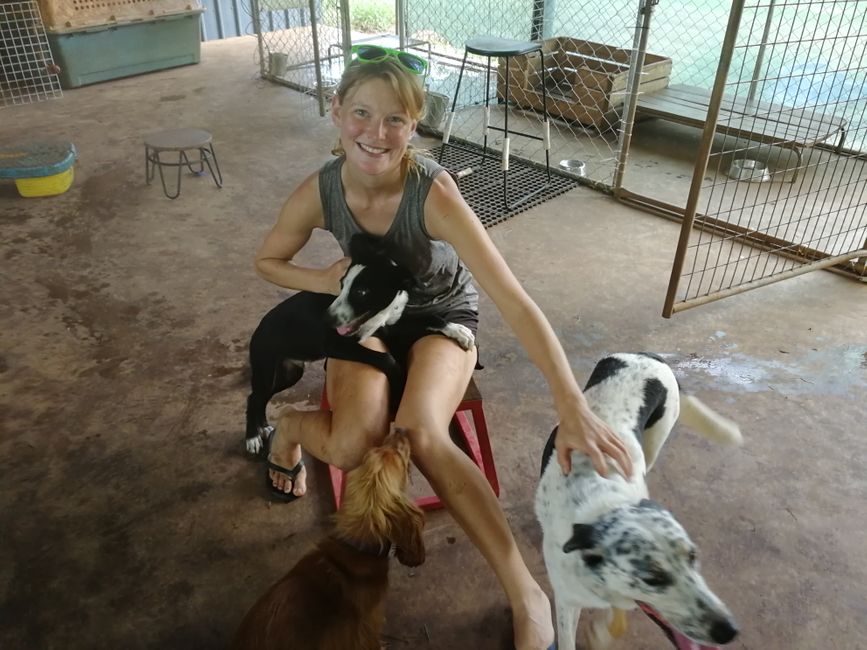
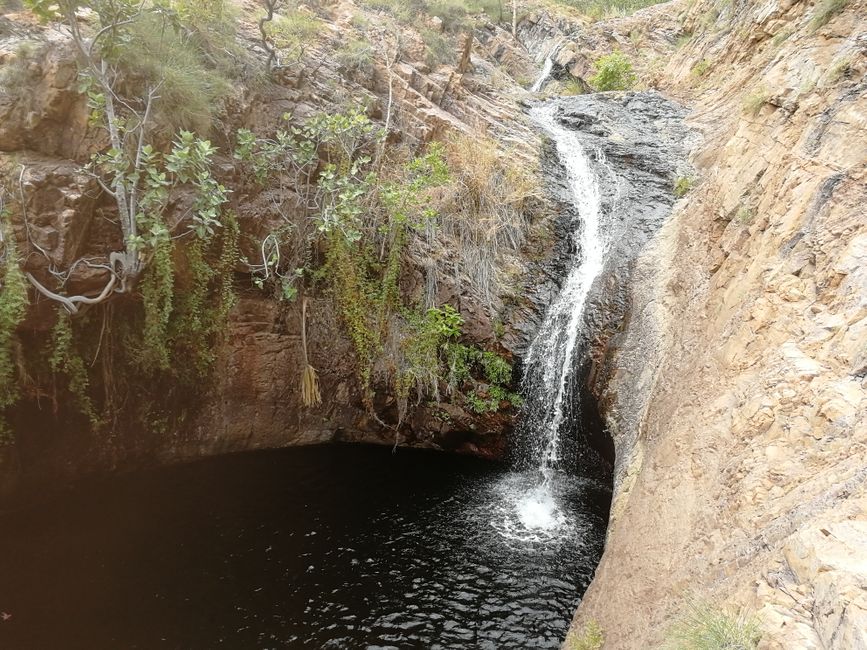
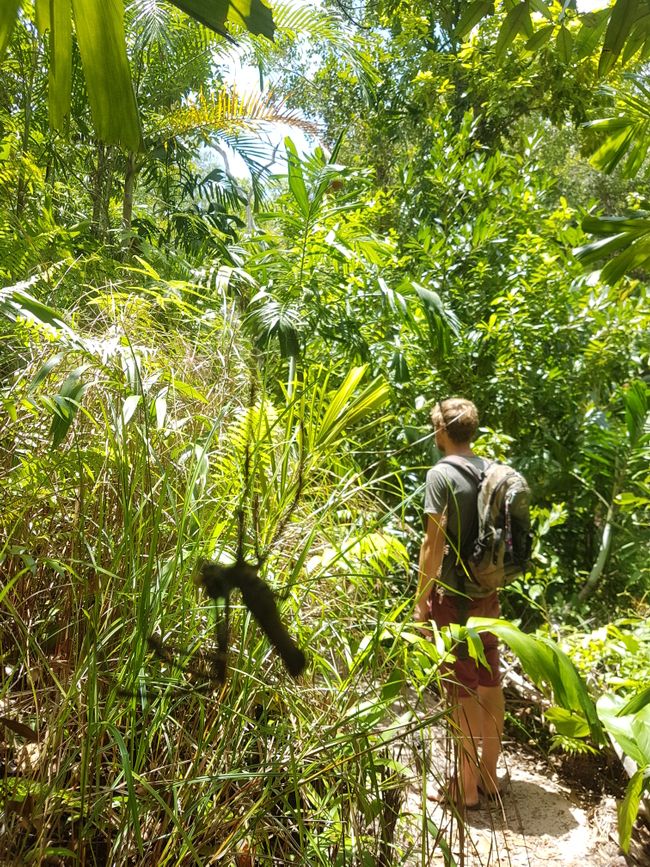
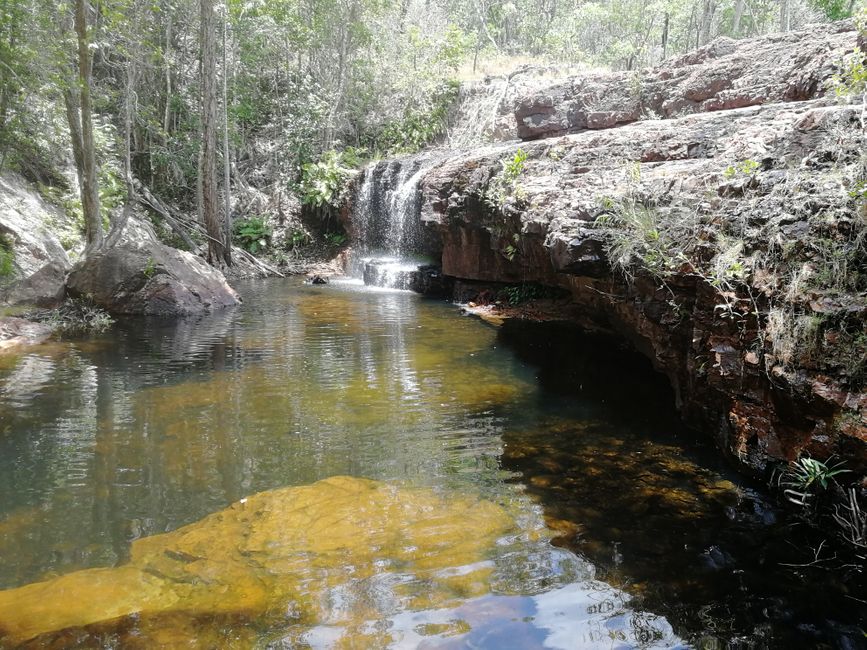
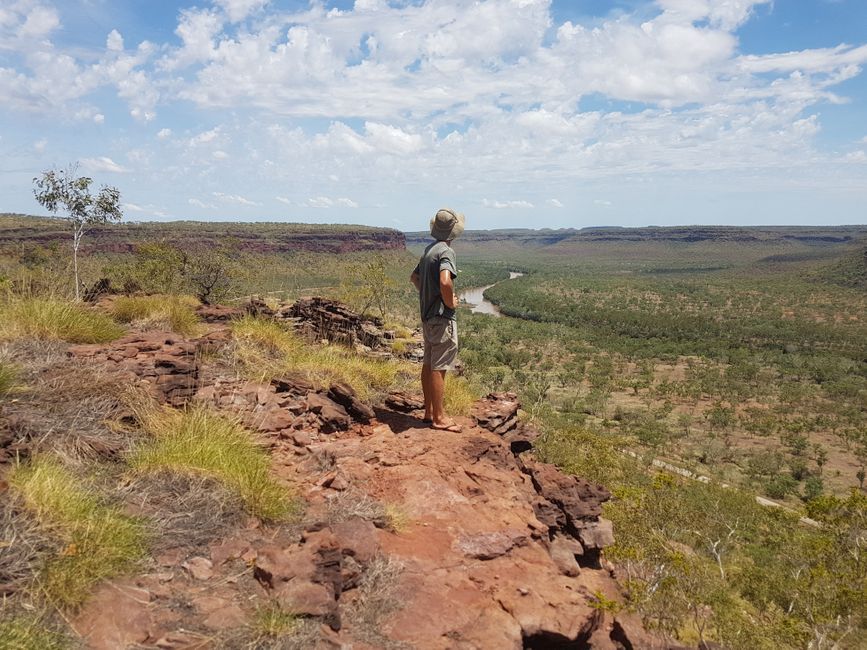
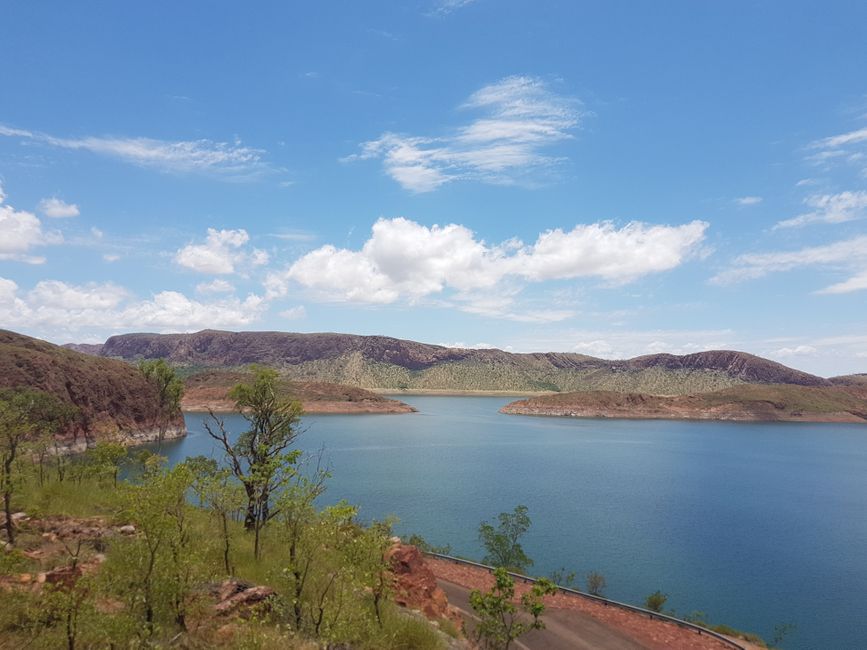
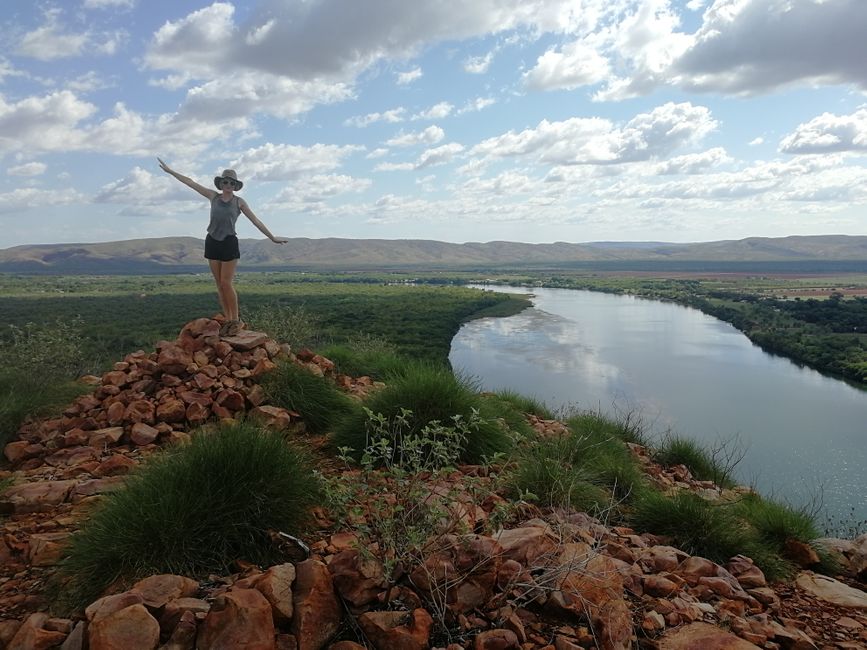
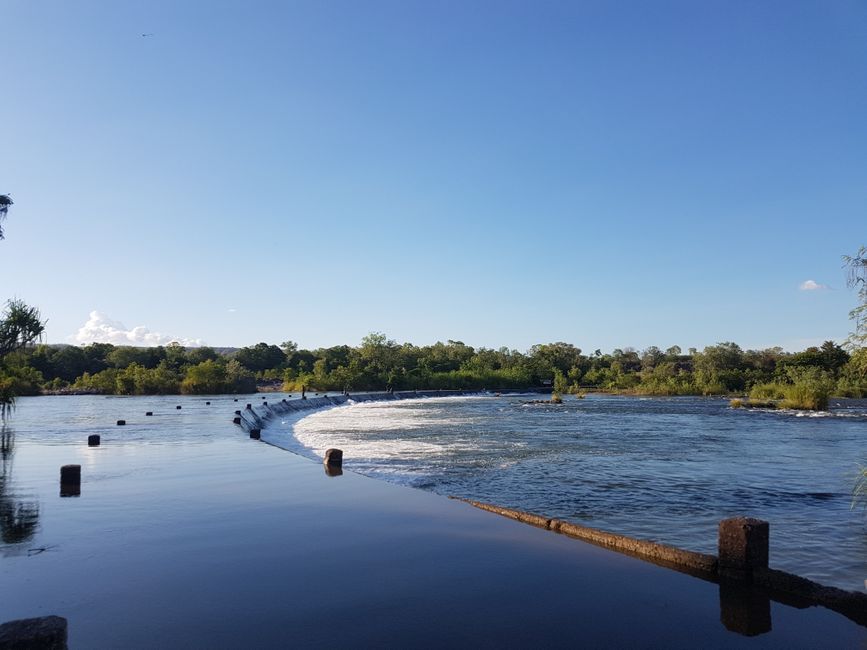
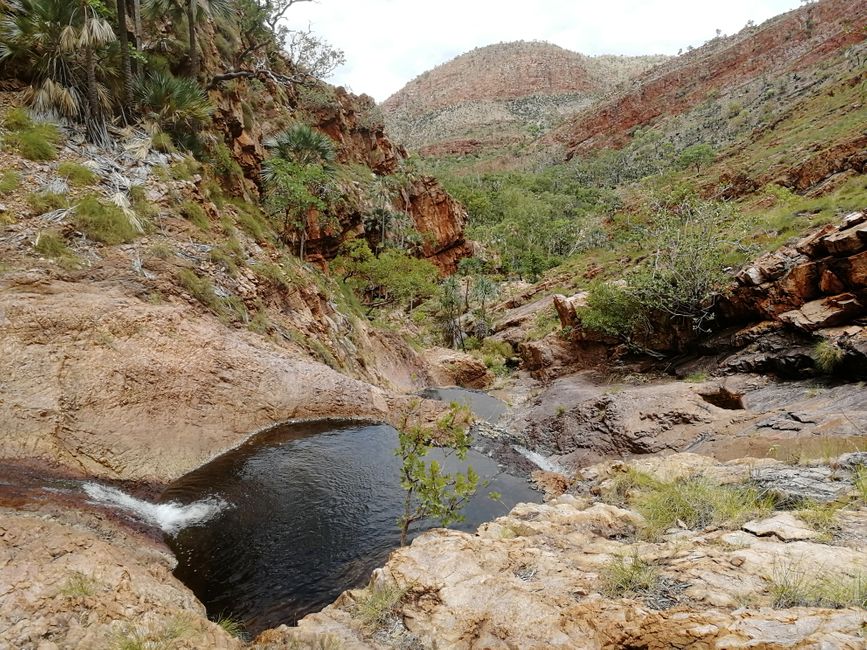
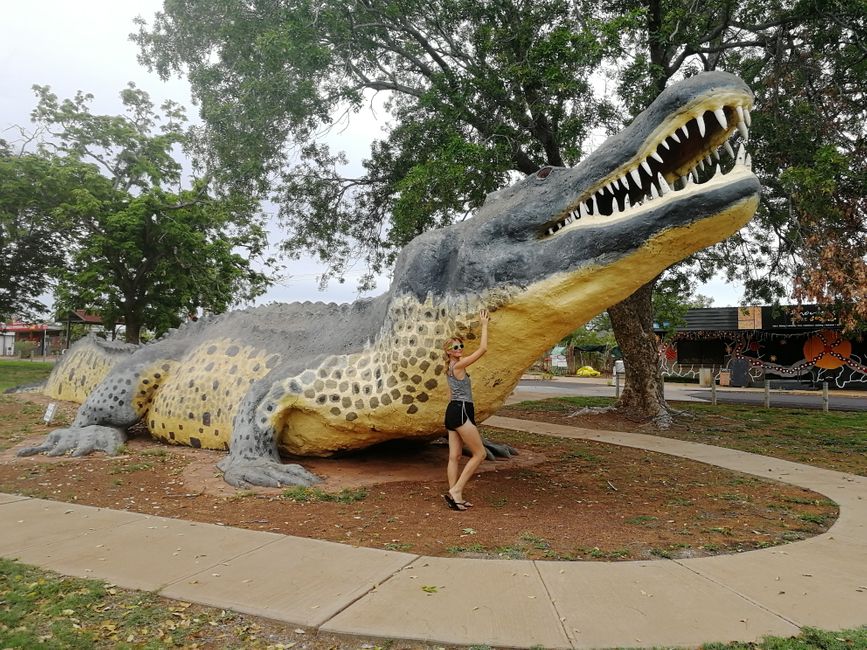
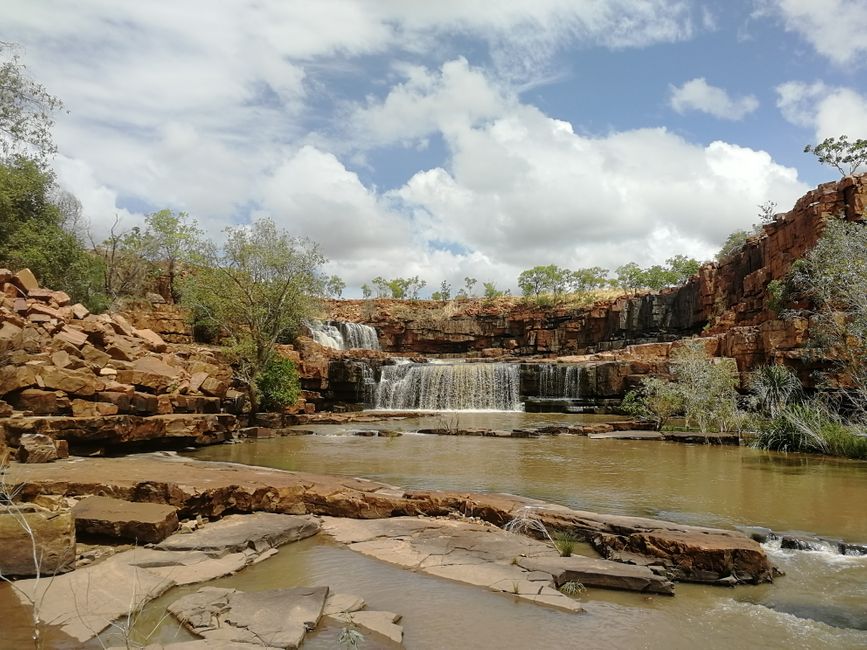
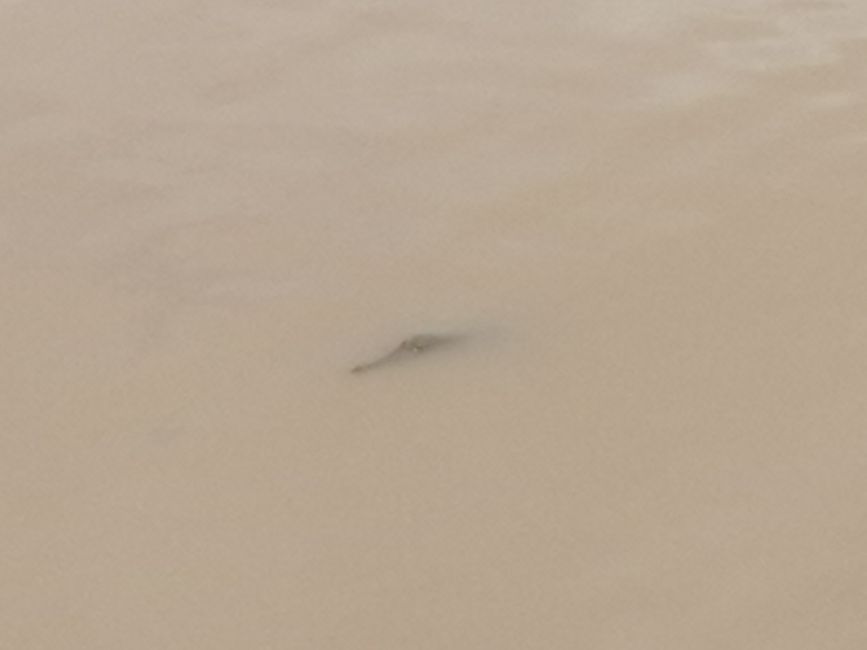
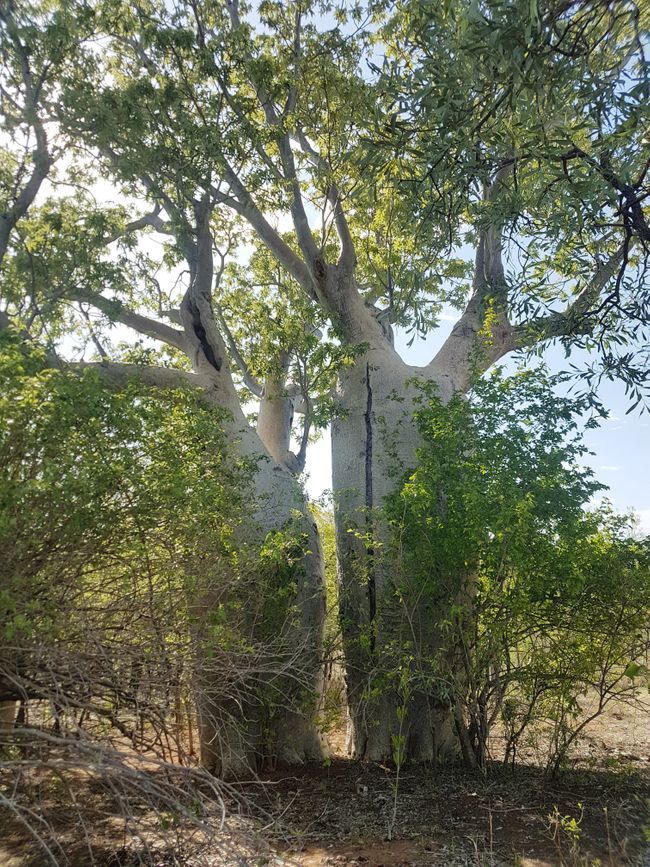
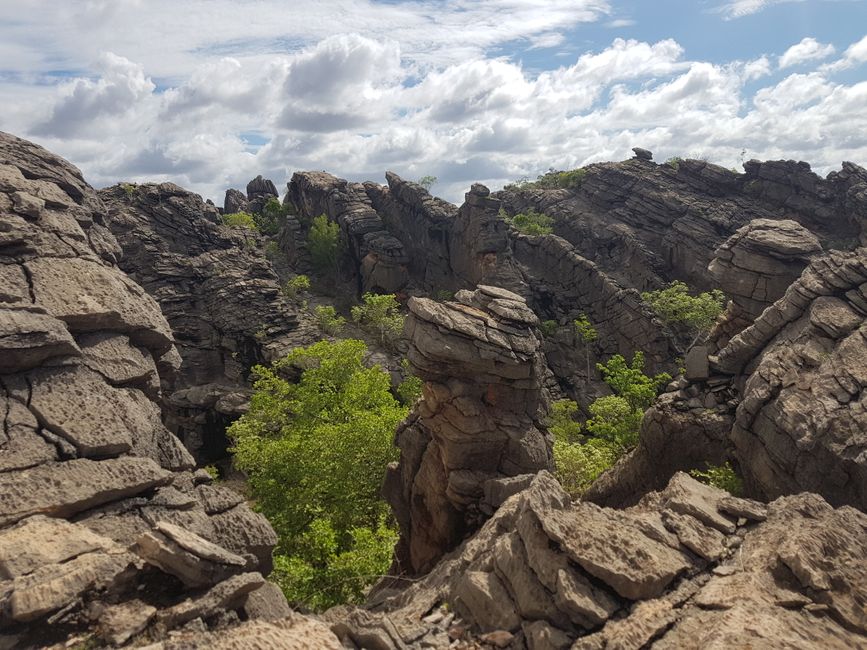
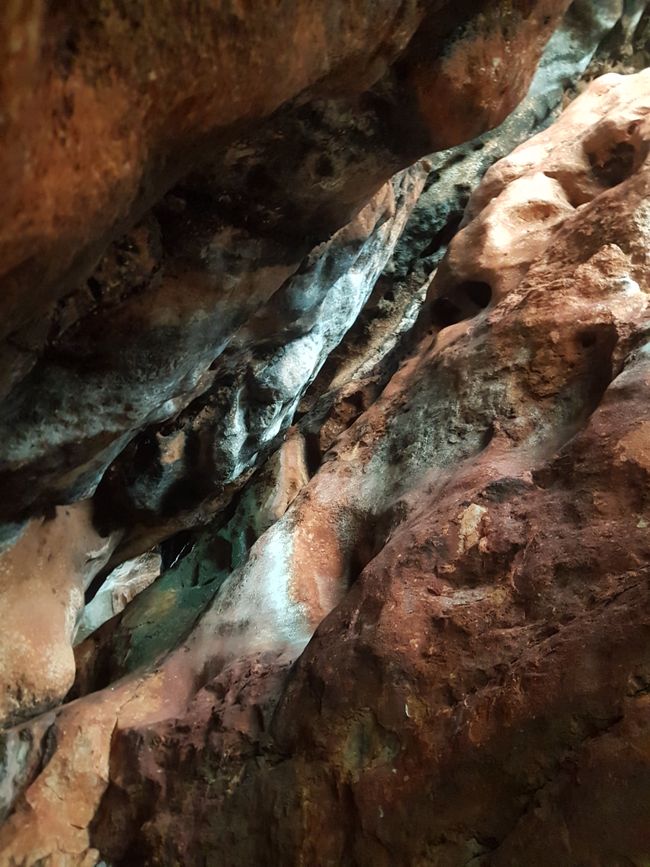
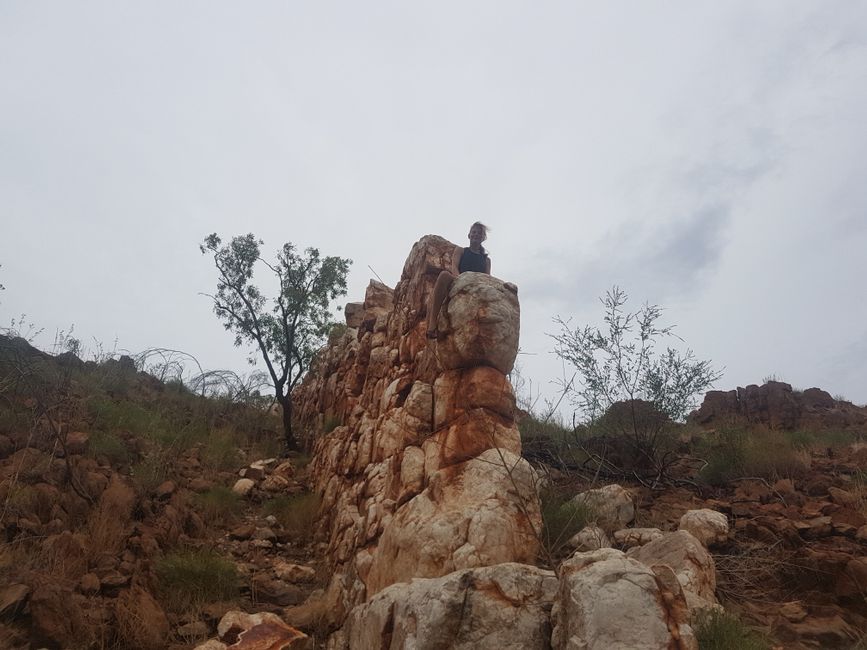
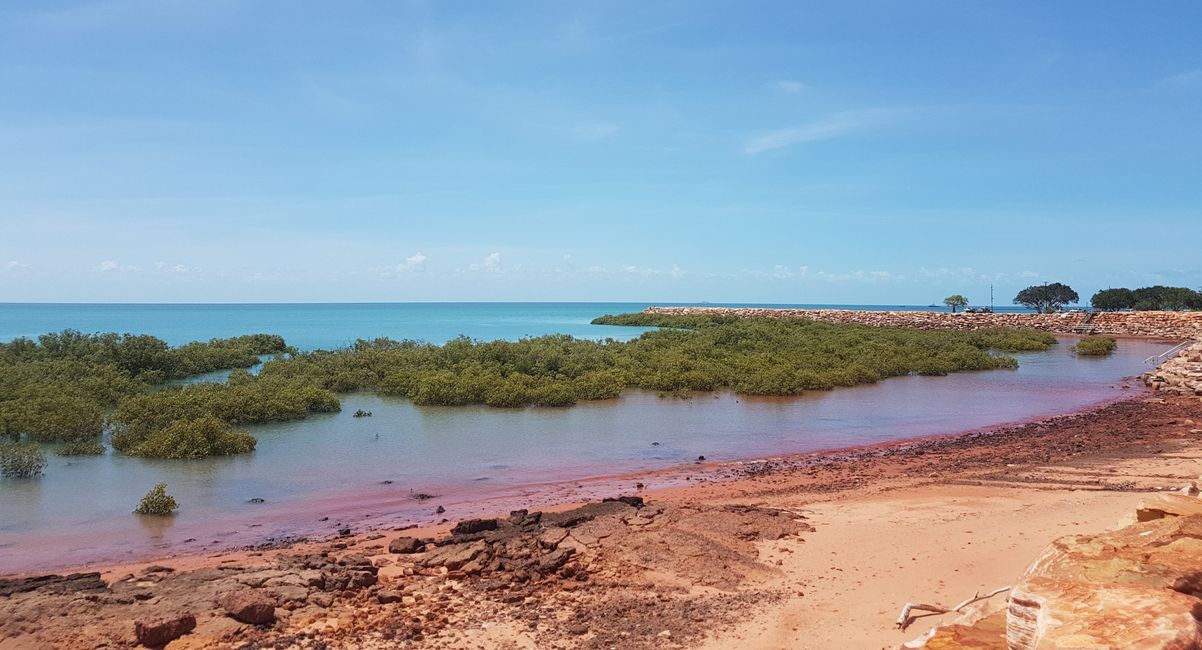
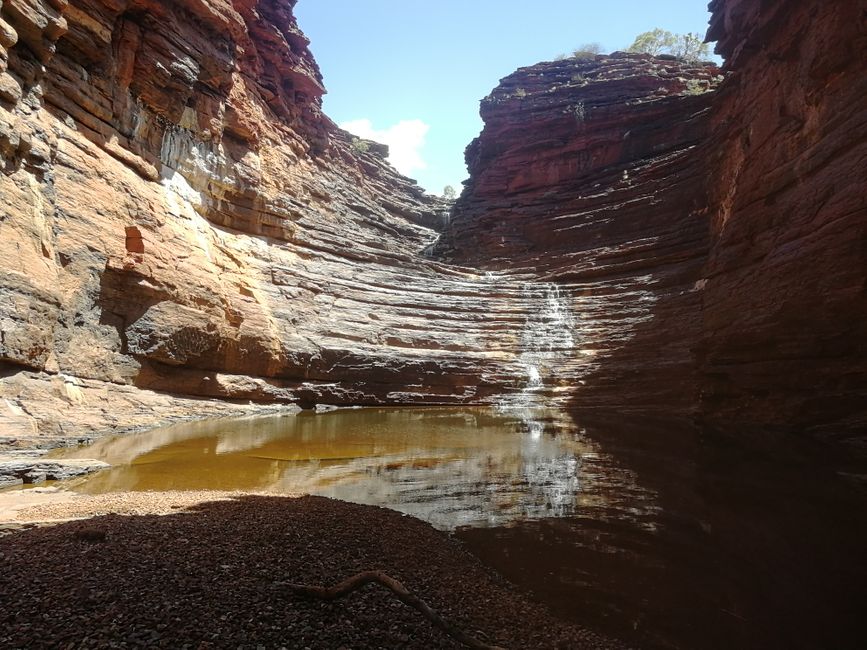
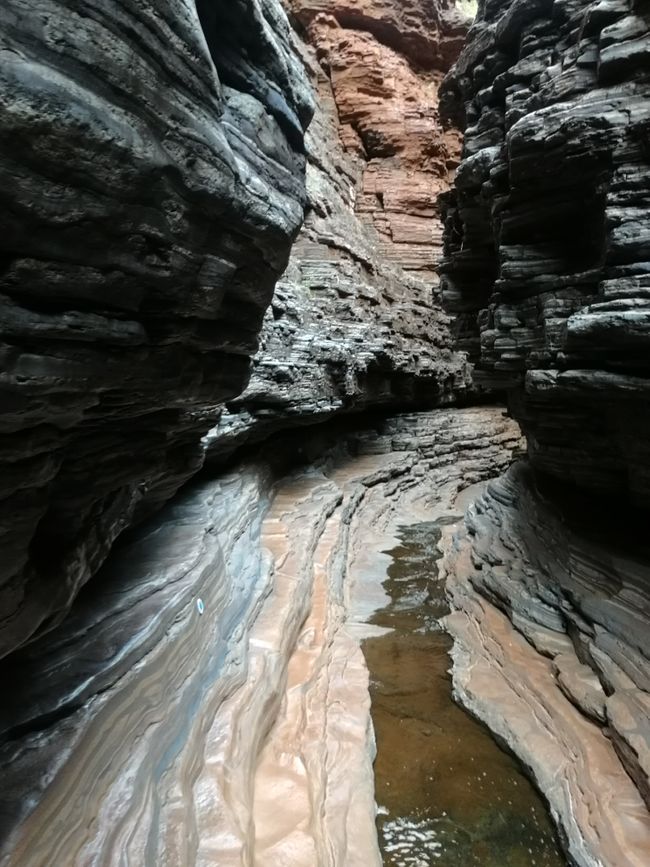
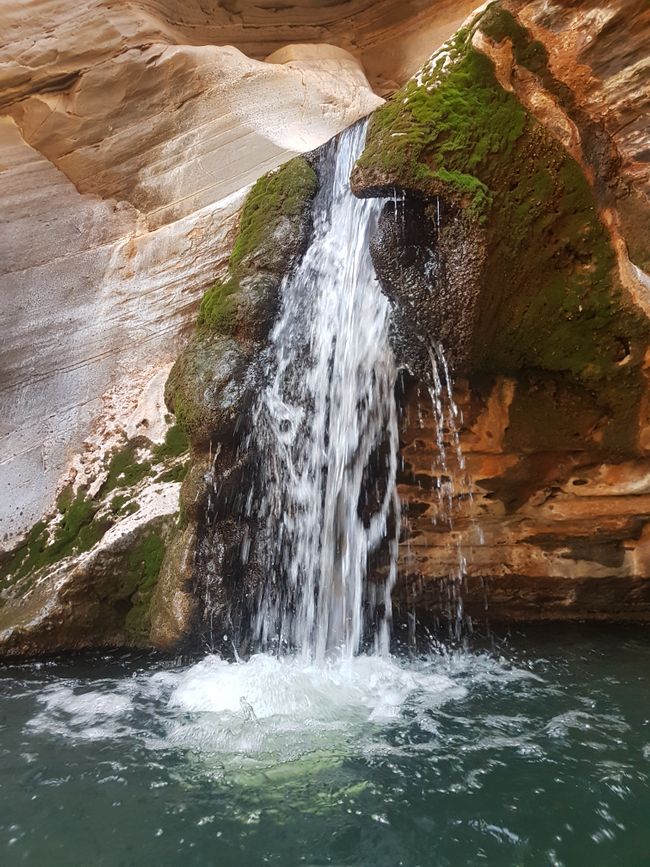
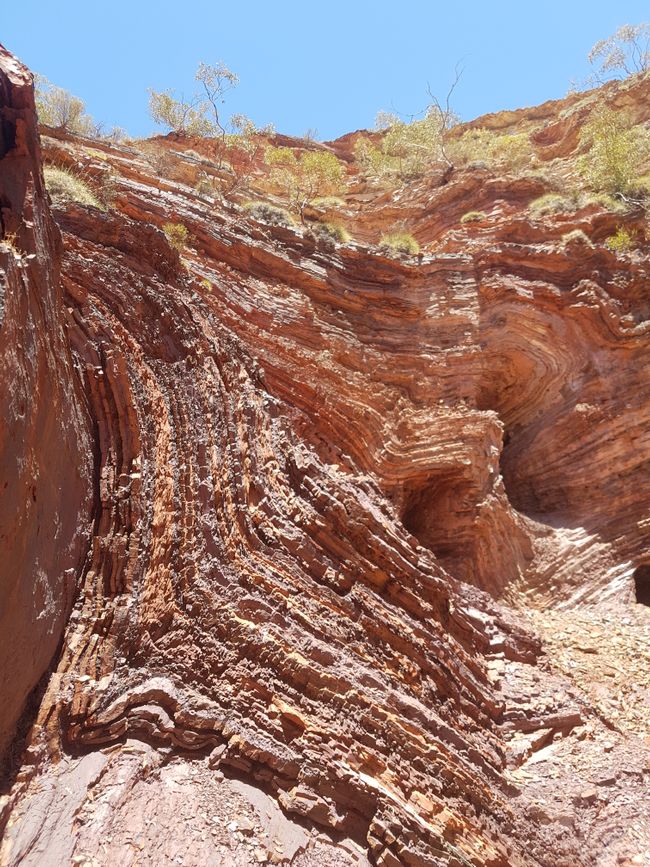
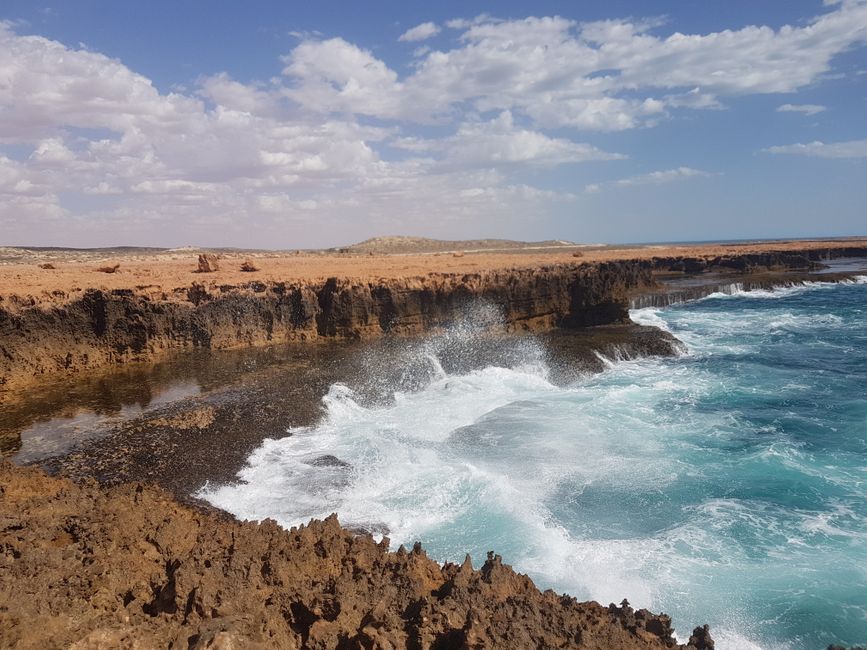
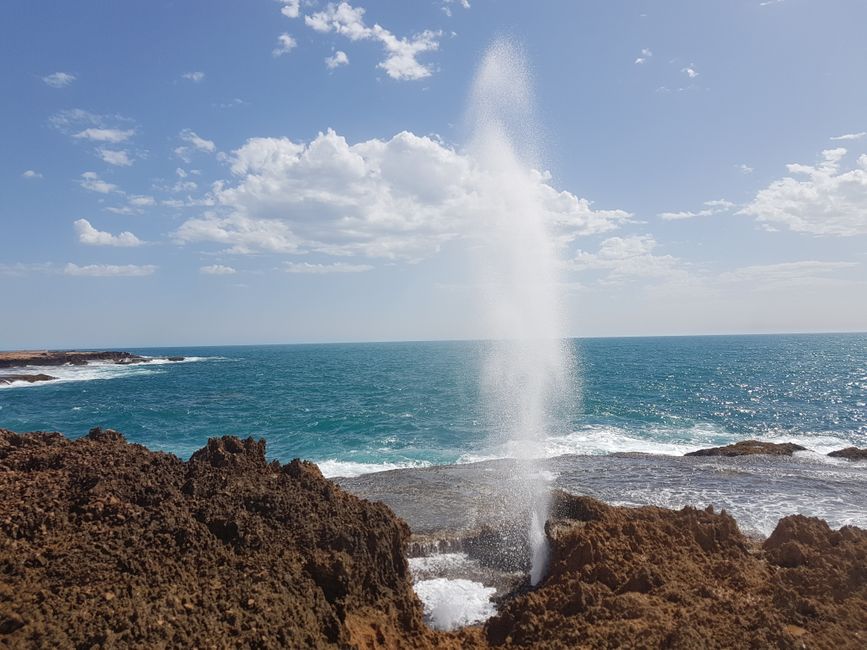
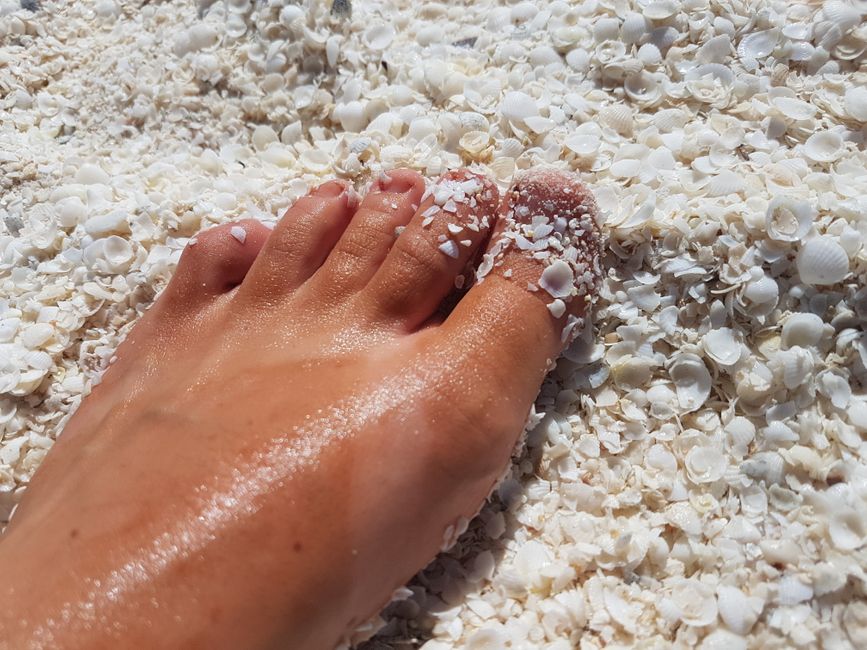
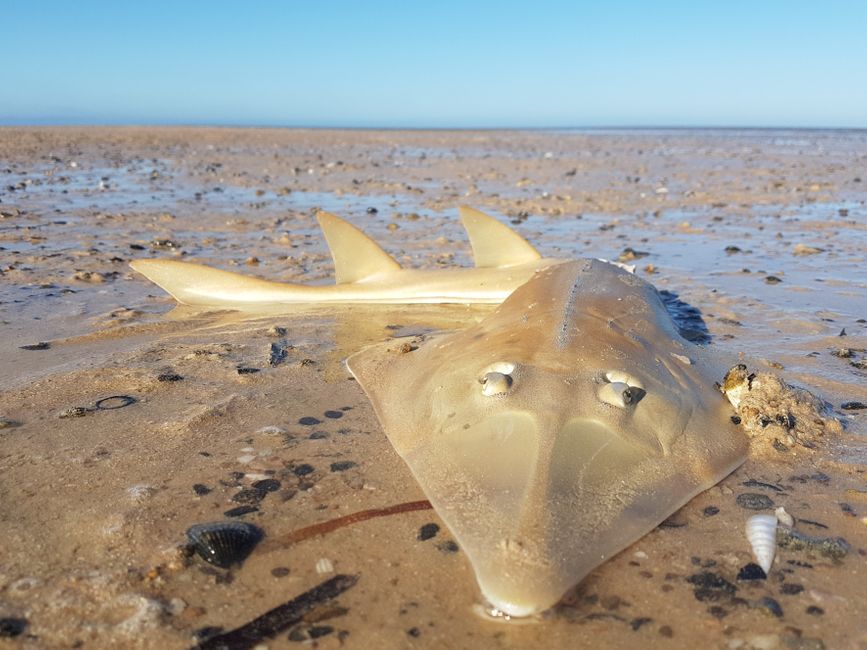
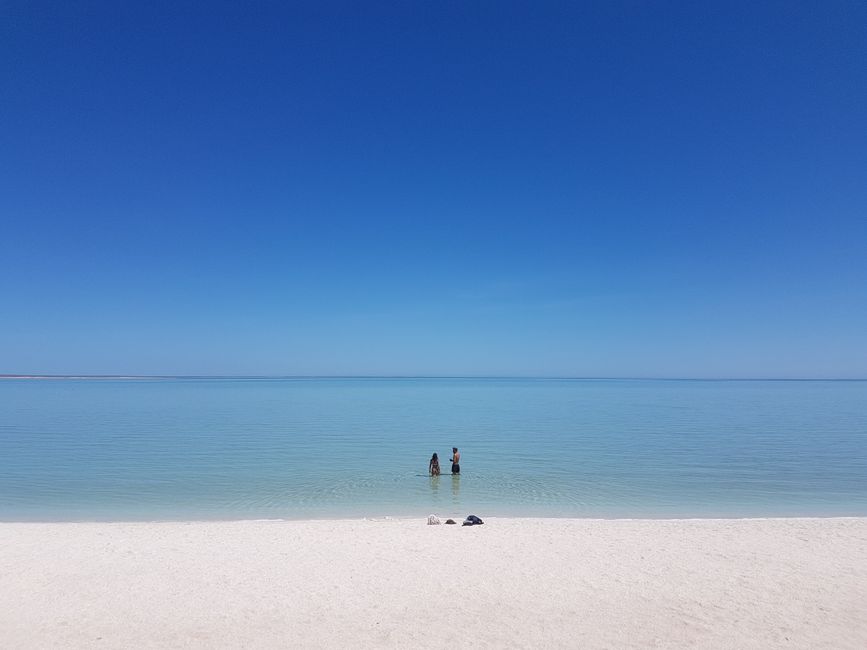





ለጋዜጣ ይመዝገቡ
After being jobless, there was no reason to stay on the farm any longer. However, we didn't miss out on the farewell party with high-quality barbecue and free drinks. The Sunday after, we explored Katherine Gorge and stayed at the peaceful national park campground with a pool, which offered a fantastic view of the starry sky at night as there was no lighting. The next morning, we went on a long hike to Butterfly Gorge. The air was burning hot, so we thoroughly enjoyed cooling off in the crocodile-free water of the gorge. And the fact that we were all alone there... at least until a small group of tourists on a boat passed by and waved at us with surprise and concern. We climbed along the rock plateaus, enduring medium-degree burns on the soles of our feet. On Wednesday, our job at the traveling carnival started. We began at half past eight and spent the whole day setting up. Tyrone and Riggs were the bosses, and there was also stocky Glen, funny Gabriel from Argentina, slightly skinny and pale Sam, and his noticeably more muscular namesake. We got along great with all of them, and although there was a lot to do, everyone except Matze and me took a very relaxed approach to work, taking a smoker break every 20 minutes. I was eager to prove myself as a woman among all the men and received some appreciative words. We stayed overnight on-site, which was very convenient and cost-saving. There were showers and toilets, and the men had erected a fence to keep fairground visitors out of the private areas. The next day, I spent over 2 hours skewering about 500 sausages onto individual wooden skewers. When the visitors arrived in the evening, I was already quite excited. I was responsible for the game stand and the many prizes. The big plush animals were the most coveted prizes, requiring a lot of luck (lottery tickets) or extreme accuracy (dart arrows or balls) to win. I could diagnose clear tendencies of addiction in some people, some children were exhausting or heartbreakingly disappointed. With a few people, my heart melted, and they received a slightly larger prize for their persistent efforts. Matze took turns operating the mini locomotive and a mini carousel that he had to push to start. Most of the attractions had some peculiarities or quirks, many of them self-welded. But you could tell that the men enjoyed the work. On Sunday morning, we woke up in a lake. It had rained so heavily at night that the whole meadow was under water. This made dismantling extremely difficult, especially the bouncy castles couldn't be rolled up soaking wet, as they would quickly mold in the heat. We managed to dismantle most of it by the afternoon, then Matze and I set off for our new temporary home in Humpty Doo. It was already dinner time, and after a tour of the house we moved into a nice room with air conditioning on the upper floor. Everyone sat down at the table together, except for our hosts Lisa and Greg, there were also Marie and David, a French couple, living in the house. Once a week, there was a supermarket delivery, among other things, due to the abundance of fruits and vegetables for the birds. Our tasks, for which we had food and accommodation, were feeding the birds and entertaining and feeding the dogs in their kennels. The birds were given grains, pollen, and liquid food, which Greg mixed himself every morning. He invested a tremendous amount of time in his birds, having been a zookeeper for many years but having to retire due to a problematic hip. In addition to the birds, Greg also had snakes - all non-venomous pythons - and bred rats and mice for their proper care. They were housed in an air-conditioned container and definitely did not have a bad limited life. He also bred crickets as animal feed, so many that he could even sell some of them. Most of the birds were colorful and sometimes deafeningly loud parrots and cockatoos. Of those that Marie and I fed, I immediately liked the sociable little fig parrots the most. We shared the work with Marie and David, and only when one team was free, did the other team have a bit more to do. However, we never worked for more than 4 hours a day. The dogs were a sometimes very wild gang, with Sparkie, an Australian Collie, being the undisputed boss, who could perform a whole lot of tricks - if there was food as a reward. Their owner Lisa was a dog trainer and ran an animal shelter in Darwin, so she often worked on weekends and didn't have as much time. Lizzie was the cuddliest dog, and the other dogs sometimes annoyed her quite a bit. Rickie, the youngest of the group, was often insecure, so I tried to practice and take walks alone with him on the property. When he saw another dog behind the property fence, he trembled like a leaf and wanted to get away quickly. We started every morning at 8 with the birds, then the dogs. In the afternoon, all the birds got something to eat again, and it was play and training time for the dogs. We had a great time watching the dogs, some of them even dared to go down the slide, like Sparkie, although he was actually too big for it, but if the motivation was right... Disagreements were not uncommon among the nearly 10 dogs, everyone wanted attention, and some - like Lizzie - just wanted peace from the others. After 1 week, we had the weekend off and explored Darwin, went to yoga, and enjoyed the shade on the spacious terrace. It was only slightly cooler than in Mataranka, but the humidity was enormous. The pool was my favorite refuge at noon and after work, lined with palm trees, and if you were lucky, you could observe birds and possums. On our second free weekend, we went to Litchfield National Park, even though there had been showers every afternoon for a few days, we didn't want to miss the visit. The water at the foot of the various waterfalls was always cold and crocodile-free (at least for now), and the hiking trails were very beautiful. In the afternoon, rain started, so we grabbed our umbrella and continued hiking. The advantage of the somewhat unsettled weather was that there weren't as many people in the national park. Especially not on the route that we took on in the evening: the off-road track from the national park southwards, where we would cross several rivers. Due to the rain, even more sections of the track were flooded, and it didn't look like it would stop soon. But Matze had done repairs and maintenance on the car in the past days, so we were well prepared - provided that the water wasn't higher than 70 cm anywhere. When we arrived at Sandy Creek campground, I was very relieved to see two other cars there, so we weren't the only brave ones. With our foldable rain cover, we were able to cook and sit relatively dry, although a bit chilly. It's crazy how a little rain can sometimes cause temperature drops. The next morning, we set off directly to Tyajnera Waterfall. We were alone, and the rushing water flowing into the pool shaded by the rock made me shiver. Fortunately, the rest of the off-road track was not excessively flooded, and we managed the river crossings (although my pulse reached unexpected heights). When we arrived in Humpty Doo in the early evening, it was raining again. Marie and David also planned to continue their journey in the next few days, they had done some repairs and improvements on their van. On December 2nd, we said goodbye to the many animals and the 4 people and drove until a little behind Katherine to a free camp. It was pouring rain, but luckily, there was a shelter with benches that was high enough for us to park the car backwards underneath it, so we could access the trunk without getting everything wet. The next day, we drove through a fairly desolate and rocky area, the Gregory National Park. In the shade of holey sandstone rocks, numerous palm trees grew in an otherwise extremely dry area, and brown and yellow Aboriginal paintings adorned the walls. Around noon, we crossed the border into Western Australia. Unlike previous border crossings - no checks from New South Wales to Queensland, only a corona form and a brief passport check from Queensland to the Northern Territory - this time our car was also opened. There is great concern that pests could be brought into the state. You are not allowed to bring fresh fruit or vegetables across the border, nor self-dried ones, plants, and parts of them are also taboo. A friend of ours had to pay a $80 fine for an apple. They didn't find anything to complain about with us, but the passport check still took a few minutes and it was quite nerve-wracking when we were sent alone into a room with 2 fully equipped police officers. Luckily, we were able to answer all their questions to their satisfaction and were allowed to continue. We stopped at Lake Argyle, one of the largest lakes in the state, with so many arms and islands in it. From the viewpoint on the dam wall, you couldn't even see a tenth of it. The water looked clear, and the mountain ranges that lined the lake reminded me of the Alps. However, the temperatures contradicted this association, it was just under 40 degrees. In the afternoon, we reached our first city in Western Australia, Kununurra.
Upon arriving in Kununurra, we first restocked our depleted groceries, and then we left the city again towards the west. The route took us across the Ivanhoe Crossing, a road through a river, to the Middle Springs, a small waterhole where we treated ourselves to a little snack. A bit further on, we came across a beautiful waterfall that had turned the surrounding rocks black with algae, hence its name 'Black Rock Falls'. The sun was slowly setting, so we headed to our campsite for the night, a small freecamp near the river. The next morning, we drove along a somewhat challenging off-road track that took us to the Secret Springs, a natural wonder with various waterfalls and pools. We climbed all the way up, discovering ever more breathtaking spots, bathing, enjoying the view, and just as we were back at the car, a whole group of people arrived. Luckily, we were there early. We drove back to Kununurra, where we refueled and then continued to Wyndham, the northernmost town in Western Australia. We visited the museum, learned about the town's history, took some photos with a huge crocodile, had breakfast, and then continued towards Broome on the west coast. On the way there, you have 2 options. Either you drive 1200 km on the Great Northern Highway, or you take the beautiful, approximately 800 km long route on the Gibb River Road (unpaved, gravel). Along the route, there are some of the most beautiful sights that Australia has to offer, and it is the centerpiece of the Kimberleys. Unfortunately, everything was closed due to the rainy season from November to April. However, to our delight, the road itself was still open, so we decided to drive along it. Unfortunately, there wasn't much to see, but a few things were unaffected by the closures. We spent the night on a mountain with a magnificent panoramic view of the surroundings. The next day, we stopped at a waterfall, where we could observe numerous crocodiles. We took our time as there wasn't much else to see. In the afternoon, we found another open swimming spot in a small canyon, and as soon as we were back at the car, it started raining again, great. The road turned into a partially flooded track of soapy mud, making driving very difficult, and we could only progress slowly. Fortunately, we didn't have much further to go until our camp for the night. However, before that, we had to cross a river that had swollen due to the rain. I walked through it beforehand (hoping that the crocodiles wouldn't find me) to estimate the depth and flow rate. Our car sank into the water up to the middle of the doors, but we managed to make it through. After about three-quarters of an hour, we finally reached our overnight location and set up camp. It kept raining and raining. The next morning, everything was wet, but fortunately, the rain had stopped. We took a walk to a nearby waterfall, the Adcock Gorge, and then drove a short distance back to a roadhouse with a gas station, after which we wanted to continue. Unfortunately, this plan fell through. We were informed that the Gibb River Road had been completely closed due to the rainfall. A river on our onward route was completely flooded and impassable, presumably for several days. With a heavy heart, we turned around and started the journey back. Just before Kununurra, we stayed at a freecamp because we didn't have enough fuel left to make it to the city. A truck driver from the city, who always exchanged shifts with his colleague at the camp, offered to bring us a jerrycan in the morning. Fortunately, we received our gasoline, and we drove to Kununurra once again. After refueling, a little looking around, shopping, and refilling our gas bottle, we set off again, this time the boring route. We made good progress, spent the night at a small river, took a walk the next morning, and continued on our way. Our camping spot the next evening was an abandoned gravel pit. Millennia-old limestone, eroded by rain and wind, lined the area and was crisscrossed by caves that served as a home to bats and other creatures. We explored the surroundings a bit before sunset and the next morning, and then continued on. Destination: Broome - finally.
Clara had booked us a fantastic Airbnb in Broome, so we first took a shower after a long time and then went into town. I had to go to the auto shop to get a few new brake pads, and Clara went to see the old Japanese cemetery. After that was done, we enjoyed the huge covered terrace in our accommodation, had something to eat, and I started repairing the brakes. The next morning, we explored the city, went to the weekly market, and learned a lot about the local history, pearl divers, and the trade in mother-of-pearl, which made Broome what it is today. In the afternoon, we visited the Matso's Brewery, taste-tested a few local specialties, and then went to the Moontide Distillery. Later, we treated ourselves to a delicious dinner in a restaurant and enjoyed our last night in a real bed. After a relaxed morning and the usual packing, we drove to Gantheaume Point, the southwestern tip of Broome, with breathtaking rugged sandstone cliffs in various colors that sandstone can have. Back on the highway, 500 super boring kilometers awaited us, interrupted only by a breakfast break. The next day, we reached Port Hedland, where Clara went swimming again. Finally, no more danger from crocodiles and other creatures. After a detour to the tourist information, we made our way to Karijini National Park, one of the most famous parks in Australia. We spent the night at the national park campground and set off early in the morning to make sure we could see everything. We hiked to all the attractions, our legs were sore, but we saw some of the most beautiful waterholes, waterfalls, and canyons. Along the way, we met two guys who would accompany us for the next few days. On the next morning, we set off for Hamersley Gorge, probably the most famous sight in Karijini, and then continued to Tom Price, a small town in the western part of the national park. We restocked our water and beer supplies, played Frisbee golf, and I had a poop in a toilet that talks and plays music. After that, we continued towards Exmouth. We spent the night at a small freecamp by the road and reached the town around 10 am with the last drop of fuel. First, we refueled and then had a delicious breakfast in a small, very nice restaurant. After that, we went to the beach, where we saw a few turtles during their breeding season. With that done and a little viewpoint at the lighthouse, we went to the two local breweries, where we sampled some very tasty beers. The sun was slowly making its way to the western horizon, so it was time to find a nice spot for the night. We took a 'shortcut' to the other side of the island. A full-blown off-road track with high sand dunes similar to those in the Simpson Desert at the beginning, in the second third full of rocks and high steps that pushed our car to its limits. We hit the ground several times, scraped the underbody on something, and even pushed the tire inwardly. With a flashlight, running ahead and checking, and bridging steps with stones, we finally made it to the other side. Clara was at her wits' end, I was hungry, and it was much later than expected. Half an hour later, we finally reached the campground in Cape Range National Park. We set everything up, cooked a quick dinner, reconciled after the argument about the shortcut, went to bed, and slept like babies. The guys joined us again in the morning, they had camped on the other side of the island and wanted to drive along the coastal route with us. In the afternoon, we encountered more problems. All the coastal campsites were 'self-contained', meaning you needed a chemical toilet to be able to stay there. After a short discussion with the guys, we decided to do it anyway, as no one had ever checked us before. It was a beautiful camp right behind the dune on the beach. Just very windy, but with a few tarps and the cars, it was manageable. The next day took us to Coral Bay, where we did some snorkeling and refilled water. Clara wanted to stay in town, but due to the beginning holiday season, all the campsites were fully booked. We decided to continue and spent the night at a small freecamp by the road, again with a tarp as a windbreaker. The next day, we reached Carnarvon, a farming and backpacker paradise about 900 km north of Perth. We checked into the campsite, watched the sunset, and enjoyed a nice shower. In the morning, Clara went for a walk, and I visited the space museum. Between the 60s and 80s, this was the main headquarters of NASA in the southern hemisphere for monitoring and communicating with the moon missions, very interesting. Our next destination was the Francois Peron Peninsula. To be precise, it consists of two peninsulas with large bays in between, filled with very salty water and the largest seagrass meadows in the world. A paradise for dugongs, stingrays, and sharks. In a particularly salty part, you can see stromatolites, ancient accumulations of various microorganisms that populated the Earth over 3.5 billion years ago. The second large bay is Shark Bay. Here, the water is not as salty and it is the habitat for various shark species, stingrays, pufferfish, and turtles. We went snorkeling a bit and then drove to Denham, the capital of the peninsula. We spent the rest of the day there, taking a little walk, relaxing, and then finding a nice camp on the beach between the dunes. The next day was the 24th, and we didn't really know exactly what we wanted to do or where we wanted to stay. We set off, had breakfast a bit inland in scorching heat with millions of flies, and then continued to Kalbarri. Somewhat aimless and quite late, we decided to book the last available accommodation in town, the hostel. Not cheap, but it was Christmas, and we had a fantastically cozy bed and air conditioning. Refreshed and recovered, we explored the city a bit more and the coastal cliffs further south, reaching Hutt Lagoon in the afternoon, a lake that is completely pink due to cyanobacteria. It's quite cool to see. Shortly after, we reached our next overnight spot, called Elbenjo, a wildlife sanctuary for all sorts of creatures that wouldn't have had a chance elsewhere. The camp was beautiful, with a large kitchen, toilet, and showers, a splendid view of the surroundings, and nice owners. We were the only people there and the next morning, we were given a tour of the enclosures with the animals, which we were also allowed to feed. There were goats, pigs, kangaroos, emus, chickens, parrots, and a fox. The parrots were really cool. They would sit on us everywhere, squabble over the food in the bowls we were holding in our hands, and sometimes nibble on our fingers. After that, we said goodbye to our hosts and made our way to Geraldton. The city is located 400 km north of Perth and is one of the most important port cities in Australia. Unfortunately, almost everything was closed when we arrived, so we just took a little walk through the city center and went to the parking lot where you can camp for free for one night. In the morning, right after getting up, we were approached by a guy - as it turned out shortly afterwards, a German who has been living in Australia and Hawaii for many years. Since one of our plans had been postponed to the next day, he offered us to spend the night at his place. We gratefully accepted. We spent the day exploring the city, most things were open again. In the evening, we went to Mike's (the German), had a few beers with him, and listened to his pretty crazy life story. The next morning, we said goodbye and went to the beach to redeem my gift from Clara. Water jetpack (flying with water-powered jets on the arms). Unfortunately, like the day before, it fell through again because the wind was too strong and the water too turbulent. A little disappointed, we left the city. We stopped for a swim and breakfast at a small river, and then continued south. In the afternoon, we reached Wedge, a small settlement of weekend cabins right between the dunes. They were built illegally by fishermen on state land between the 60s and 80s, and so far, they haven't been chased away. It was quite interesting to see the different cabins and how many people were out and about. We were even invited to take a look inside one and camp in the garden, but we wanted to go a little further. 50 km south of Wedge, we left the highway for a small bush track through the dunes down to the beach. When we arrived at the beach, we immediately got stuck in a slanted spot close to the water. Usually, the sand is harder at the water, but not there, north of Lancelin. A group of people a little younger than us, who were also camping where we had planned to, helped us by pulling us back the two meters over the dune crest with their car. After that, it was just relaxed beach driving and a short walk to a huge dune from which people were snowboarding (obvious, as the dunes are as white as snow). After pumping up the tires again, we drove to the beach, took a quick dip in the water, and then had breakfast. From there, it was only about 130 km to Perth. We quickly covered the distance and around half past four on December 29th, about 2 years after our arrival in Australia, we were back in the capital of Western Australia. The first half is done!
ለጋዜጣ ይመዝገቡ
መልስ

